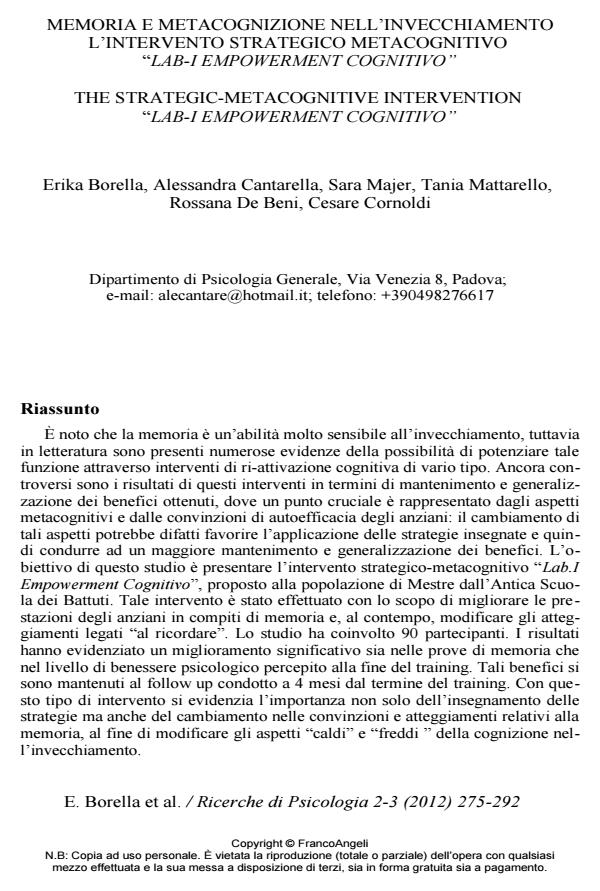The strategic-metacognitive intervention "lab-i empowerment cognitivo"
Journal title RICERCHE DI PSICOLOGIA
Author/s Erika Borella, Alessandra Cantarella, Sara Majer, Tania Mattarello, De Beni Rossana, Cesare Cornoldi
Publishing Year 2013 Issue 2012/2-3
Language Italian Pages 18 P. 275-292 File size 236 KB
DOI 10.3280/RIP2012-002009
DOI is like a bar code for intellectual property: to have more infomation
click here
Below, you can see the article first page
If you want to buy this article in PDF format, you can do it, following the instructions to buy download credits

FrancoAngeli is member of Publishers International Linking Association, Inc (PILA), a not-for-profit association which run the CrossRef service enabling links to and from online scholarly content.
It is well know that memory is an ability very sensitive to aging. However, in literature there is evidence that memory can be improved through different cognitive interventions. More controversial are the findings relative to transfer and maintenance effects obtained with cognitive trainings. A crucial point is represented by metacognitive aspects and self-efficacy’s beliefs of older adults: the potential change of these aspects might favor the strategies’ application in everyday life, and thus favor a further benefit in terms of maintenance and generalization. The objective of this study is to present the strategic-metacognitive intervention "Lab.I Empowerment Cognitivo", proposed to the community of Mestre (Venezia) by Antica Scuola dei Battuti. The aim of this intervention was twofold: first, to improve older adults’ memory performance and, second, to improve participants’ attitudes toward "remembering". Ninety individuals participated in this study. The Results show the importance of proposing cognitive intervention in which both strategies and metacognitive activities/considerations (attitudes and beliefs about memory) are taken into account, focusing both on "hot" and "cold" aspects of cognition, in aging.
Keywords: Memory training, metacognition, memory strategies, active aging.
- Interventi di potenziamento del ben-essere psicologico nell'invecchiamento Erika Borella, Alessandra Cantarella, Rossana De Beni, Veronica Muffato, Davide Pacher, in RICERCHE DI PSICOLOGIA 1/2015 pp.109
DOI: 10.3280/RIP2015-001006 - Efficacy of memory training interventions targeting metacognition for older adults: a systematic review and meta-analysis Enrico Sella, Elena Carbone, Margherita Vincenzi, Enrico Toffalini, Erika Borella, in Aging & Mental Health /2023 pp.674
DOI: 10.1080/13607863.2022.2122931
Erika Borella, Alessandra Cantarella, Sara Majer, Tania Mattarello, De Beni Rossana, Cesare Cornoldi, Memoria e metacognizione nell’invecchiamento l’intervento strategico metacognitivo "lab-i empowerment cognitivo" in "RICERCHE DI PSICOLOGIA " 2-3/2012, pp 275-292, DOI: 10.3280/RIP2012-002009